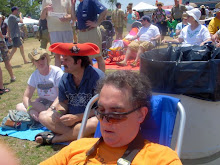A Judicial Bully In Philadelphia
Generally, you'd think that, once a jury goes into deliberations, that they'll either agree on a verdict or hang. In the last ten years or so, that understanding has started to break down. Now, if only a small number of jurors disagree with the majority (especially if the disagreeing jurors are holding out for an acquittal), they may be labeled as "nullifiers" in some courts, and removed from the jury.
U.S. v. Thomas: a synopsis
The trend started with a case out of New York, U.S. v. Thomas, 116 F.3d 606 (2nd Cir. 1997), a drug case in which the sole black juror was holding out for acquittal. Numerous other jurors sent the judge a note, in which they complained about the hold-out feigning vomiting and otherwise disrupting deliberations. They said that the hold-out was ignoring his instructions and would not convict whatever the evidence.
The trial court judge then questioned the holdout, who said that he just wasn't convinced from the evidence. The judge dismissed him from the jury, believing that it was likely he was simply refusing to convict, or committing jury nullification. The remaining 11 jurors convicted the defendants.
The Second Circuit, while whining (as courts so often do) about jury nullification being a bad thing, determined that for a trial court judge to dismiss a sitting juror, there had to be no doubt that the jury was refusing to follow instructions. Because the holdout in Thomas had given some indications that he was not satisfied with the evidence, dismissing him was unjustified, and the defendants got a new trial.
8 Years Later: U.S. v. Kemp
Last April,in the corruption and bribery case against Philadelphia City Treasurer Corey Kemp, these issues again arose. Juror Margaret W. Szewczyk, 57, was removed from the deliberating jury by Judge Michael M. Baylson, a 2002 Bush appointee, and replaced by an alternate because the judge believed she had displayed "bias" against the government and the FBI, and had thus "violated her oath."
Her offense? Other jurors reported that in deliberations, she had said that "the FBI lies," and that the government "didn't play all the calls."
Of course, those are factual statements. The FBI has been caught lying, and in fact, some agents have been so frustrated with FBI perjury that they've gone public. So saying that the FBI lies simply means that FBI agents don't get a pass on credibility; that, just like any other witness, the jury has to determine whether to believe them.
Saying the government "didn't play all the calls" is probably true as well, as most wiretap cases involve hundreds and hundreds of wiretaps - and the prosecution, naturally, cherry-picks which calls to play.
What makes this more frustrating is that Szewczyk denied making the statements other jurors attributed to her. It was plainly not proven beyond all doubt that Ms. Szewczyk was not willing to follow her instructions. "This case is now no longer just about Corey Kemp and City Hall," said Kemp’s lawyer in an interview with the Philadelphia Inquirer. "We're dealing with a serious legal issue that cuts right to the heart of the right to a trial by jury."
Baylson, a true activist judge and former federal prosecutor, should look in the mirror if he wants to see the face of bias. Clearly, he couldn't believe that an unbiased juror just might be a little skeptical about the government evidence. But in this case, it appears that he may have handed the defense a clear shot at an appeal.
Baylson failed to meet the test of U.S. v. Thomas. Ms. Szewczyk was left unconvinced by the evidence, and this is why, by any reading of the case, she was removed. Her statements made it clear that she did not believe the government had proven its case, because of omissions in the testimony and because its professional witnesses had not been credible. These are her decisions to make.
If Ms. Szewczyk had said, of the defendant's testimony, that "people accused of crimes lie," would Judge Baylson have sent her packing? If she had said "paid expert witnesses are hired guns, willing to say anything for a buck," would she have been sent home? What if, instead of it being the FBI she was skeptical about, it was a private investigator hired by the defense?
It is up to the juror whether to believe a witness, or whether to be skeptical. It is up to the government to prove their case through credible evidence. A juror who remains unconvinced is entitled to vote not guilty - and the accused is entitled to the benefit of that vote.
The place to screen out biased jurors is in voir dire. There are no allegations that Ms. Szewczyk was dishonest during voir dire. Saying that she was biased, at this late date, is a little too easy: any time a jury hangs, we can just call those who disagree with the majority "biased," replace them, and keep going until a verdict is reached. Of course, this makes a mockery out of the concept of a unanimous verdict.
To Judge Baylson, for denying Mr. Kemp the benefit of Ms. Szewczyk's vote, and in depriving him of the benefit of a unanimous verdict, I can only say "shame, shame."


0 Comments:
Post a Comment
<< Home